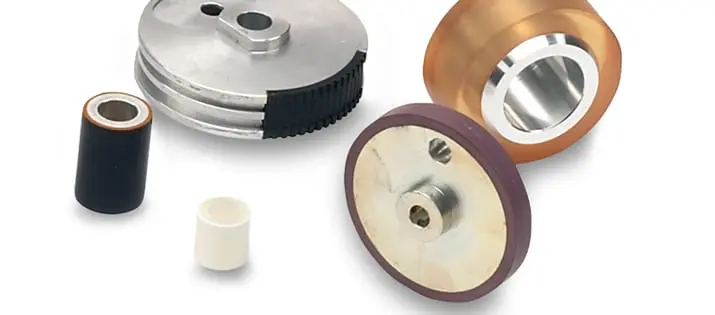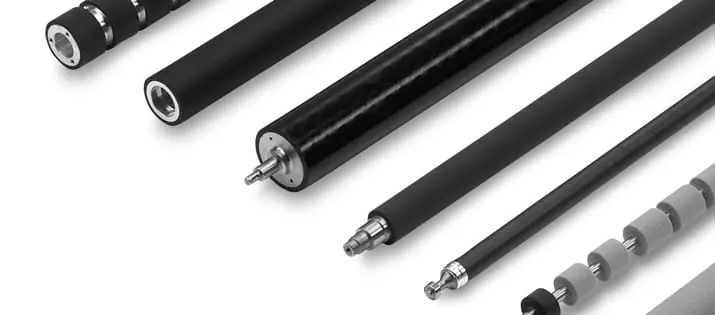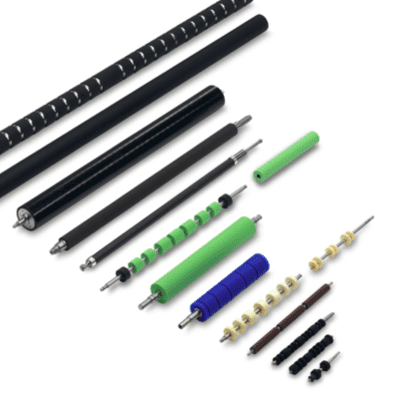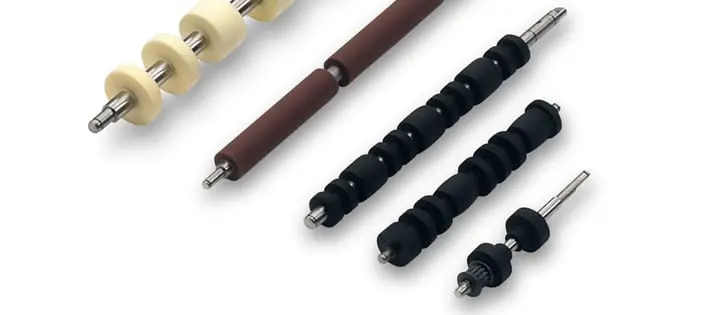Enbi are global rubber roller manufacturers with over 75 years of experience, delivering precision-engineered rubber rolls that enhance performance, durability, and efficiency across industries.
Engineered for performance. Enbi designs and manufactures industrial rubber rollers built to withstand demanding applications in printing, packaging, material handling, and beyond.
Advanced manufacturing. Using technologies such as inertia welding, precision roll forming, and specialized coatings, we produce custom rubber-coated rollers tailored for accuracy and longevity.
Trusted worldwide. With a dependable global supply chain and manufacturing sites across four continents, Enbi ensures consistent quality, innovation, and on-time delivery.
Trusted by OEMs worldwide for high-performance industrial rubber rollers.
A rubber roller, sometimes called rubber rolls, is a cylindrical device used in many industries for different applications. It is valued for its resistance to wear and tear, heat resistance, and dimensional stability. The outer layer is typically made of elastomer compounds, which provide a smooth and durable surface.
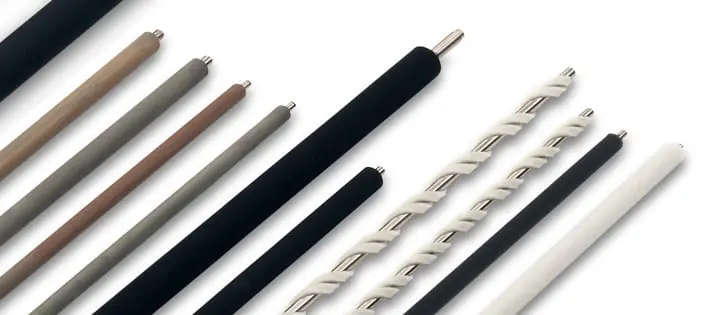
The paper industry relies on rubber rollers for paper transport and laminating processes, while they are also used in various other industrial applications, including ATM and ticketing systems. Manufacturing involves covering a core – usually stainless steel or rigid composites – with an elastomer layer that is engineered for each application. With their versatility and durability, rubber rollers and rubber rolls remain essential tools in industrial and manufacturing processes.
Our rubber rollers are widely used across industries for their durability, versatile properties, and reliable performance. Each type is engineered to meet specific industrial requirements.
Drive Rollers
One type is the rubber drive roller, used for movement and conveying materials in industrial settings. These rollers are commonly found in manufacturing processes, particularly in the paper industry, where they play an integral role. Rubber drive rollers provide dimensional stability and a smooth surface for the efficient movement of materials.
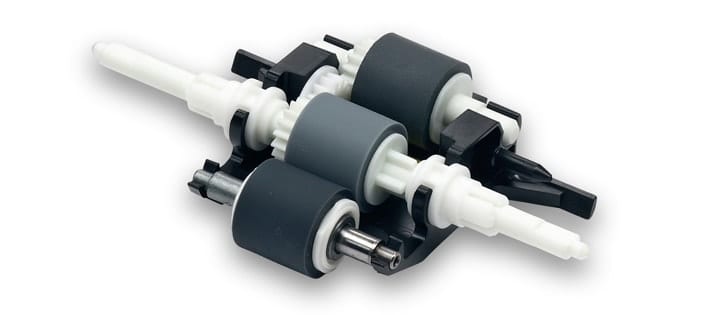
Conveyor Rollers
Another type is the rubber conveyor roller, used as a moving system component. Made from durable rubber with a robust core, these rollers are commonly used in industrial applications for transporting heavy loads. They are known for their strength, durability, and long service life.
Grooved Rollers
Grooved rollers are another type of rubber roller that is used in various industries. They have a specific grooved pattern on the surface, which allows for better grip and control during the conveying process. Grooved rollers are commonly used in applications requiring precise movement and control.
Silicone Rubber Rollers
Silicone rubber rollers are also highly sought after for their heat resistance. They are commonly used in laminating processes, where high temperatures are involved. Silicone rubber rollers are known for their excellent thermal properties, making them suitable for applications in which heat resistance is crucial.
Several types of rubber rollers are available for various industrial applications. Rubber drive rollers, rubber conveyor rollers, grooved rollers, and silicone rubber rollers have specific uses and advantages. Their durability, heat resistance, and precision make them indispensable components in many manufacturing processes.
Durable & Versatile
Industrial rubber rollers are engineered for durability and long service life. Their elastomer surfaces absorb impact and vibration, resist wear, and ensure smooth material flow – making them indispensable in industrial manufacturing environments, from printing to converting.
Heat Resistant
Manufacturing processes often involve elevated temperatures, and rubber rollers are built to withstand them. Compounds like EPDM, Silicone, and FKM offer excellent heat and chemical resistance, making these rollers ideal for high-speed printing, laminating, and other heat-intensive applications.
Custom Sizes & Profiles
Rubber rollers are available in a wide range of diameters, lengths, and configurations – including cylindrical, grooved, and laminating styles. This flexibility ensures they integrate seamlessly into a variety of industrial systems and machinery.
Abrasion & Corrosion Resistant
Industrial rubber rollers must endure constant contact, pressure, and exposure to chemicals. Their abrasion and corrosion resistance reduces maintenance and ensures performance in harsh production environments.
Non-Marking & Surface Safe
The non-marring properties of rubber rollers help protect delicate materials during handling and finishing – ideal for manufacturing sectors where product appearance and integrity are critical.
Precision Grip & Control
In applications where alignment, pressure, and material feed are vital, rubber rollers provide consistent traction. This is especially important in industrial printing, packaging, and web handling operations.
Built for Performance
Whether you need rollers for heavy-duty loads or sensitive substrates, rubber rollers can be tailored by durometer, surface finish, and material composition to meet specific industrial manufacturing needs.
Elastomer Compounds
Rubber rollers are typically constructed with a durable elastomer layer bonded to a metal or composite core. These elastomers – such as natural rubber, silicone, or EPDM – are selected for their wear resistance, heat tolerance, and chemical stability. The outer rubber surface delivers the traction and dimensional stability needed in industrial printing, laminating, and packaging processes.
Natural Rubber
Natural rubber is favored in manufacturing for its elasticity, fatigue resistance, and thermal stability. It performs reliably under repeated stress and elevated temperatures, making it ideal for rollers used in high-speed paper and printing applications. Its smooth surface ensures consistent ink transfer and quiet operation.
Synthetic Elastomers (e.g., EPDM)
Synthetic compounds like EPDM provide excellent weathering and chemical resistance, along with superior mechanical performance across wide temperature ranges. These properties make them suitable for both indoor and outdoor industrial environments, as well as applications requiring electrical insulation.
Metal Cores and Shafts
The roller core is typically made from stainless steel or other metal alloys to ensure high strength and structural integrity. These materials resist deformation under heavy loads and provide long-term corrosion resistance – key attributes in demanding manufacturing settings.
Rubber Compounding Additives
To meet specific performance needs, elastomers are blended with reinforcing fillers (e.g., carbon black, silica), plasticizers for flexibility, stabilizers for UV and oxidation resistance, and vulcanizing agents for structural integrity. This enables the production of rollers tailored for ink transfer, chemical exposure, or high-precision feed control.
Uses and Applications of Rubber Rollers
Rubber rollers are used across a wide range of industrial and manufacturing sectors for tasks such as material handling, ink transfer, adhesive application, and product finishing. Their durability, heat resistance, and ability to maintain dimensional stability make them ideal for demanding environments.
Common applications include:
- Printing & Paper Converting – Rubber rollers ensure even ink distribution, precision alignment, and reliable traction across flexographic, gravure, and offset systems.
- Laminating & Coating – Used to apply adhesives and coatings with consistent pressure and control.
- Packaging & Label Production – Support the manufacturing of tapes, labels, and flexible packaging by guiding, pressing, and stabilizing materials during high-speed processes.
- Material Conveyance – Offer grip, support, and control in conveyor and feed systems across multiple industries.
- Banking & Ticketing Machines – Provide consistent paper feed in ATMs, ticket printers, and kiosks.
Rubber Rollers in the Paper Industry
Rubber rollers play a critical role in printing, converting, and finishing applications within the paper and packaging industries. Their primary functions include:
- Ink Transfer – Deliver consistent and accurate ink distribution for sharp, high-quality prints.
- Dimensional Stability – Maintain uniform pressure and alignment to prevent misfeeds and ensure registration accuracy.
- Traction & Grip – Grooved or patterned surfaces enhance substrate control and minimize slippage.
Engineered for resistance to abrasion, chemicals, and elevated temperatures, rubber rollers perform reliably in high-speed, high-friction production environments.
Other Roller Types
Beyond traditional rubber options, polyurethane-coated rollers offer enhanced resistance to abrasion and deformation. These can be molded directly onto the shaft or applied as foam and precision-ground to the desired profile – making them ideal for applications requiring tight tolerances and extended wear life.
Get a Quotation
Please complete the form below telling us about your industrial rubber roller requirements.

Find your local Enbi facility to enquire about our industrial rubber rollers.

Urgent technical question? Contact our experienced engineers for advice.

